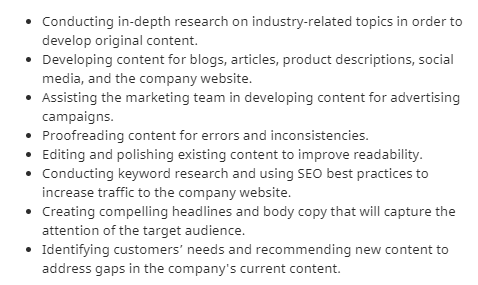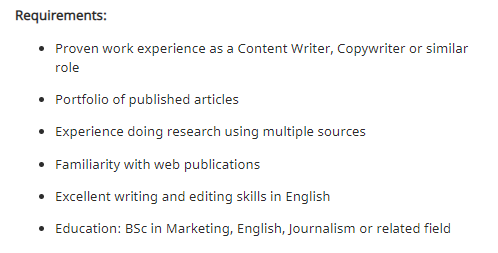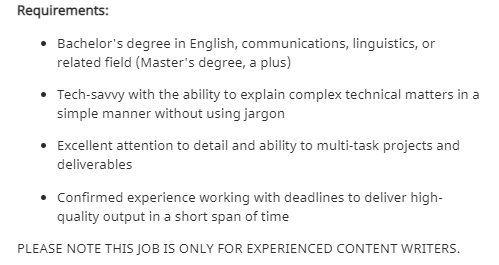| Listen to this content!
Getting your Trinity Audio player ready... |
The estimated reading time for this post is 16 minutes
Content writers are really easy to find. However, knowing how to hire a content writer that’s the right match for your business is a whole different ball game altogether.
Remember that it isn’t just about hiring skills. It’s also about finding the most compatible culture-fit in terms of personality traits and skill-match. Most importantly, it’s about results.
You don’t want to hire a content writer and find out they’re a complete mismatch in every which way weeks down the line. By then you will have wasted a lot of time. And, maybe, lost a part of your sanity in the process.
That’s why I’ve created this comprehensive guide on how to hire a content writer for your business. This guide should take the overwhelm out of figuring how to start, get through the process, and finally hire your ideal content writer.
So, without further ado…
Step 1: Identify What You Want from Your Content Writer

The first thing to do is to figure out what you really want from your writer. This can seem like the most obvious way to start but it really is a good baseline to jump off of.
How much and what type of content do you need? If you’re just beginning, you may just need weekly blog posts to feature on your website to start with. These could be about 500 to 700 words in length, each post addressing one topic at a time. For instance, if you’re an HR business, one blog post can deal with the specific topic of ‘How to Ensure Your Resume is ATS-friendly.’
If you have the budget, you could look at scaling across your website as well as at least 3 social media channels with a combination of textual, visual, and video content.
Here are some examples of the types of content that you may need:
- Complete website copy i.e. About, Services, Home, Content pages for your website.
- Blog posts to be uploaded to your website on a regular basis.
- Content for social media pages such as Facebook, Twitter, LinkedIn, and Instagram
- Content for your sales pages, brochures, and marketing collateral
Deciding the output requirement is the first step towards hiring your ideal content writer.
Step 2: Decide Whether You Need a Full-time, Part-time, or Freelance/Remote Writer

Full-time, remote and freelance/part-time writers all come with their benefits and drawbacks, although COVID19 has definitely accelerated a more concerted move towards remote work across the globe.
- Full-time writers can be a lot closer to the team, all things considered. Given the amount of time they spend on your business, and their contractual engagement, full-time workers are more invested in your organisation. Or at least that’s the perception. Full-time writers also carry higher costs especially when you factor in benefits. The specific benefits depend on the country and the company. A lot of companies are currently employing remote workers on a full-time basis.
- Freelance/remote writers that work flexi-time are generally not entitled to benefits (please check applicable laws for specific countries) so this automatically lowers the costs considerably. It isn’t necessary that they aren’t vested in your business as much as a full-time worker. Just like how you can’t always say a full-time writer is 100% dedicated to the cause. In most cases, this is a stereotype. A lot of writers are highly committed to each and every project that they take up. However, many freelance writers do juggle assignments with multiple companies given the nature of their work which is transient in nature. Always make sure your hire has the time and can meet the deadlines.
- A third option is to consider hiring a writer for one-off projects, however, if you’re serious about growing your business, it’s wise to consider a long-term resource. Along the same lines, consider whether you will be engaging in training and developing your resource – if so, again, it would make sense to hire someone who is going to be a long-term resource.
- You also have the option of working with content writing agencies or content hubs where you can simply order content online – but the quality here needs to be tested and assessed beforehand and generally, you don’t have the benefit of a dedicated resource.
Step 3: Working Out the Cost Factor
Before you work out your available budget, it’s a good idea to understand the different variables that influence how much a content writer gets paid.

Understanding Cost Variations When you Hire a Content Writer
Costs for writers vary depending on many different factors. But these variations can make a significant difference to your budget. Here is an explanation of some of them:
The location/nationality: Expect native-English speakers to charge considerably higher than non-native English speakers. Bear in mind, this is controversial. I take exception to it too. A lot of non-native English writers can write as well as native-English writers, and it isn’t necessary that native-English writers always make good content writers. The skill-set, because essentially that’s what it is, is transferable.
The writer can set what they determine is a fair price based on their objective assessment of their own abilities and skills, given that English is taught in schools all over the world and therefore really doesn’t belong to any country at this point in time. As the world is increasingly becoming smaller, it makes sense to expand cultural boundaries and democratize.
Experience: ‘Freshers’, ‘interns’, and complete newbies generally charge less given their lack of experience while experienced writers who have racked up a few years’ worth of work experience charge more.
Expertise: Some writers specialize in a specific niche or content-type for instance B2B, B2C, Saas, Health & Wellness, Human Resources, or White Paper and Case Study writing. Again, expect to pay more as the writers have developed subject matter expertise in their niche and are also up-to-date on the trends in the industry. It isn’t necessary that general writers won’t be able to write niche-specific copy. In this case, they should have strong research skills to compensate.
Popularity: Writers who are popular or are perceived to be in-demand will, understandably, charge more.
Simple vs. Complex Work – How much time will it take?
Here we look into the actual nitty-gritty of the writing process before we go into the actual bit of how to hire a content writer. Here is a check-list to help you get started. This is by no means an exhaustive list. However, it should help you narrow down your requirements.
If you’re just starting out and have a limited budget, you might just want 500-word textual blog posts ( no images, interviews, very little research…etc.) once or twice a week.
- The length of the content in terms of the number of words – the higher the number of words, the higher the amount of research and thought that needs to go into it. Lengthy content that is high-quality will rank higher in search engines.
- The type of content – is it a quick overview or is it a mammoth compendium that goes into considerable detail AKA does it require subject-matter expertise?
- Whether research, facts and sources need to be quoted
- Whether experts or other sources need to be interviewed
- Whether non-copyright pictures need to be sourced
- Whether it’s just writing or whether you need strategic consulting as well
- How many revisions need to be included (average is 1 to 3 until the copy hits all the right notes). Some writers offer unlimited revisions.
- What action needs to be taken by the consumer at the end of the piece (if it’s pure sales, apply copy-writing principles = higher costs. I talk about the difference between copy-writing and content writing here. Copy-writing is seen as contributing directly to the bottom-line and therefore can be on the pricier side unless the writer is a newbie.)
- Whether Search Engine Optimization (SEO) is required and is being done wholly by the writer in terms of insertion of specific keywords or any other practices
- The amount of creativity required, if any
- The number of authentic and verifiable statistics that need to be added, if any.
There is no one-size-fits-all approach that will work with content/copy-writing. Allow your business and what you need to get done to dictate your needs.
The Different Ways to Pay Writers

Here are the typical methods by which writers get paid:
- Per-word pricing: Not much of a favourite among experienced writers, this method assumes a cost-per-word which doesn’t factor in aspects such as the time involvement and the amount of research involved. However, this is currently one of the most popular or to be more precise, rampant methods of payment.
- Per-hour pricing: This method came in to offset the challenge with the per-word pricing method detailed above and can be more of a leveller for writers who feel shortchanged by the per-word pricing method. This method is not available in all countries across the world.
- Per-project pricing: Like the name suggests this is pricing-per-project which should work out to be lower than pricing individual components separately.
- Per-article pricing: Another option that’s getting some interest in the industry is the per-article pricing which as the name suggests is pricing based on the specific needs of the particular article.
- Writer’s own rate card: Some writers have fixed rates and package prices – discuss with the writer for these.
- Payment in the form of a salary: This would be the normal process for full-time writers.
Some Actual Pricing Numbers for Reference
I would have liked to cover a global circumference given my network. But this does pose a number of different challenges. Instead, I’m sampling a few specific countries as follows, I may add more countries in due course:
India: In India, per-hour pricing is not very common. Per-word rates start from 20 to 30 paise per word for beginners. The recommended amount for writers with experience is 60 to 70 paise per word – anything less than this is not justifiable for original, well-written, and extensively-researched work. High-quality writers can expect a base minimum of INR 1 per word. A full time-writer can average INR 10,000 to 30,000 (give or take) depending on the amount of work involved and the specific business.
USA: Clearvoice has an exhaustive guide on what to pay content writers here. Pay rates start from $0.01/word and up to $20/hour for beginners.
UK: Skillbox reports that entry-level writers start at between £0.02 – £0.30 per word and £10-£30 per hour for a 500-word article.
South Africa – Media Update has a very in-depth guide on freelance writer rates. According to this article, corporate content is chargeable at R2 to R4 per word / R400 to R600 per hour.
The Philippines – Sadly while our brothers and sisters from the Philippines are hard workers, they are easily exploited when it comes to pay rates. According to freelance writer Joy Soriano, ”the Freelance Writers Guild of the Philippines has agreed that no writer should accept work that pays under P2/word; it’s a standard that has yet to be followed across the industry because most writers still take on measly rates.” According to payscale.ph, the average hourly rate is ₱11 – ₱546 while ph.indeed.com reports the average monthly pay as ₱24,459.
Step 4: Building a JD (Job Description)
It isn’t necessary to create an elaborate JD (Job Description) to hire a content writer for your small business. But in general, a JD is expected to have the following as a standard:
Job Title: This would be as the name suggests, the actual title of the job. For example, content writer, editor, copywriter, content specialist, freelance content writer…etc. If the job is for a freelancer, it’s important to mention this on the title so candidates know what they’re applying for.
Job Description (or Responsibilities): This details the specific requirements of the job. Here is an example from a real vacancy for a freelance content writer:

Requirements: These would be the minimum education, experience, and/or skills that you would expect from your content writer. Here are two examples:

Job conditions: These would list the specific conditions of work such as the expected pay, the hours of work and other miscellaneous information.
I’m providing some more sample JDs pooled from various sources on the internet below (click to be directed to the links). Please do also go through free job search portals for more ideas on how to craft your JD.
Step 6:Where to Find Writers
I’ve put together a list of some of the most common places where you can go about hiring writers as follows. Also check out this post by LinkedIn here which provides some other alternatives.
- Recruitment/Job portal sites like Indeed.com (country-specific sites available), Monstergulf.com (for the middle east), Naukri.com (for India)
- Social Media platforms like Facebook. Facebook is notorious for scam-artists (writers who take money and disappear or plagiarise and even recruiters who accept work and disappear without paying the writer), so a lot more diligence is required when hiring through this platform. Search for groups with the title ‘content writer jobs’ where you can share your JD and source writers.
- Professional networking sites like LinkedIn. LinkedIn is currently a more trustworthy platform to hire writers. A quote by Gary “Vee” referencing LinkedIn as a much earlier version of Facebook still comes to mind though.
- Through references from other people. This is still one of the best ways to hire a writer. Speak to other colleagues in your industry or even your social circle to see if they can provide a reference for a good writer that they were happy with.
- Several other sites have cropped up over the years which cater to the gig-market. These are also worthwhile to check out if you’re willing to spend some time searching. Upwork, Freelancer, Guru, People Per Hour, and Fiverr are some names that come to mind.
Step 7: How to Shortlist Content Writer Applications Effectively
Once you’ve received your first batch of applications, here are some things to look out for:
How well the Candidate Has Followed the Brief
It’s surprising how many applicants don’t actually read the job description. Some companies ask writers to start of their application with a specific word like ‘banana’ (just an example) so the non-readers can be screened out (see screen-grab of a real-life example below). Anyone who doesn’t follow your specific brief can be weeded out instantly. If the person can’t follow instructions or doesn’t care either which way, they’re not going to be of much help to you once they’ve been hired.
Language Skills
This is a no-brainer. The writer should have impeccable writing skills in whatever language they’re going to be writing in. If there are typos or obvious errors – it can reflect a lack of actual skill in the language or worse, carelessness.
Experience
Having previous professional experience is always a plus. However, that shouldn’t deter you from hiring someone who has random pieces of unpublished well-written content, but seems keen and looks trainable (i.e. can follow instructions and adapt as needed)
Education
Having a formal degree isn’t a necessity for good writing skills. However, an educational background such as in engineering or psychology can be a must-have if you’re looking for content written at this level of expertise.
Portfolio
Experienced writers usually have a portfolio of published work samples that they can show you so you can get a sense of how they write. Samples may either be ghost-written (where the original author doesn’t get credit as the company takes ownership of the content) or by lined (written and credited to the original author).
New writers should be able to provide you with some work that they’ve done even if it’s not strictly on an official or professional capacity.
Cover letter:
From the perspective of a recruiter, a cover letter is always a plus. Whether or not asked for, the fact that an applicant has taken the time to put together a personalised cover letter speaks volumes for enthusiasm and genuine interest.
Samples or Not
It’s a trend with some businesses to ask writers for non-paid samples written specifically for them as part of the hiring process. Sometimes these are actual full-length articles in the range of about 1000 to 1500 words. This isn’t particularly ethical given that you wouldn’t be asked to do the job for free for testing purposes in any other profession.
You have 3 options here – hire on the basis of an existing strong portfolio, ask for a shorter sample of say 250 words focused specifically on a topic of choice, or ask for a longer sample which you will pay for. Assure the writer in case of the unpaid sample that you will not use their work for commercial intent irrespective of whether they’re hired or not.
Should I Interview?
A lot of businesses don’t do an interview especially if the writer is remote, however, interviewing potential candidates can give you a real sense of whether the writer is a good fit for your workplace. Interviews can be set up via Zoom or Google Meet, both of which are free. Take into account timezone differences when scheduling your interview.
The interview should serve the purpose of filling in gaps in the resume, clarifying expectations, besides it being an opportunity for both the interviewer and the applicant to see if they’re a good fit for each other.
Step 8: Managing Expectations Going Forward

Once you’ve hired a writer, it’s necessary to provide an exhaustive brief to the writer so that he or she understands what your objectives are with the content you have in mind.
For instance, for a blog post, you would detail the following:
- A rough heading
- Topics to be covered under the heading or leave to the writer to come up with suitable material
- Any specific material that you want to be highlighted in the content with respect to your products or offerings
- The style/tone/description of target audience if these have not been covered before i.e. is the style/tone business-like or personable and friendly?
- Who they’re writing for – mothers with babies, small business owners, entrepreneurs…etc.
Expect that the content may not be 100% perfect initially especially if you’re working together for the first time. It’s common to have 2 to 3 revisions which slowly peters out to possibly needing no revisions for latter work once you’ve established and understood each other’s communication and style of working.
Expect that the content writer wouldn’t have psychic abilities. The writer cannot guess your expectations. They work with a brief and in the absence of one will create content based on what they think is the best fit for your business. Keep the channels of communication open.
Expect that not every content writer appreciates excessive micro-management. If you’re going to be re-writing everything or constantly nit-picking there’s a definite mismatch. Let go of control issues. Be gentle with criticism. Remember, they’re the writer, not you. The writer may have some valid reasons as to why they’ve used a certain opening or specific words and phrases. Communicate.
So there you have it, your complete guide on how to hire a content writer for your business. I hope you found this useful. Do feel free to comment below if you have any questions that I can address on the topic.
Until next time!

An SEO Copywriter and Digital Content Strategist based in India. I specialise in the strategic crafting of business content that increases visibility and generates organic traffic.
Email me at connect@irenelopezwriter.com or message me here

